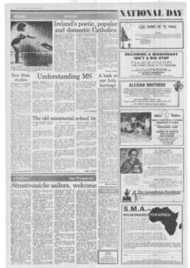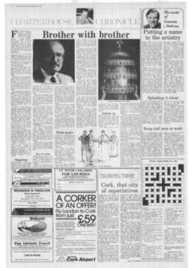Page 12, 22nd November 1985
Page 12

Report an error
Noticed an error on this page?If you've noticed an error in this article please click here to report it.
Tags
Share
Related articles
Oswald Goodier, K.c.s.g.
Our Man In Paris
Catertian Honoured
Rome Honoured Veteran Mp Dies
New Knights Of St, Gregory
Brother with brother
FOR THE Pope to appoint a Knight Commander of the Order of St Gregory is, in any circumstances, a signal honour. Recipients are usually Catholics. For a nonCatholic Christian to receive the honour is a more special event. And for the order to be conferred on a Jew is an occurrence of profound significance.
It is thus singularly noteworthy that the rank of Knight Commander has been conferred by Pope John Paul on Sir Sigmund Sternberg who, among many other appointments, is Chairman of the International Council of Christians and Jews.
It is a heartening sign of the seriousness with which unity between Catholics and Jews has been pursued of late, and Sir Sigmund could have received no higher honour from the Holy Father.
There are, in fact, only three Pontifical Orders of Knighthood higher than the Order of St Gregory: the Order of Christ, the Order of the Golden Spur and the Order of Pius IX. (The last mentioned was instituted by Pope Pius XII). These, however, are conferred only on Heads of State.
The Order of St Gregory is bestowed on laymen only (never clerics — and never women!). It is conferred as a "Reward for Services to the Holy See on gentlemen of proved loyalty." It is a condition of conferral that such gentlemen shall "maintain unswerving fidelity to God, the Sovereign Pontiff and to the Holy See."
As far as I know there has only been one previous Jewish recipient of this honour, namely the late Lord Lever of Ardwick, Labour MP for Ardwick, Manchester from 1950 to IWO. He became a Knight Commander of the Order of St Gregory in 1960 and a Knight Grand Cross thereof in 1968.
Congratulations then to Sir Sigmund who in 1981 inspired the arranging of an historic meeting between the Pope and British members of the Council of Christians and Jews.
He is now a member of an Order going back to 1831 when it was established by Pope Gregory XVI in the very first year of a pontificate which was troubled by insurrections within the Papal States, harshly crushed by Secretary of State Cardinal Lambruschini.
Today's Papacy is very different and, whatever its critics may say, a paramount concern is the promotion of peace and justice. The distinction bestowed on Sir Sigmund Sternberg is, at personal and individual level, a striking example of such concern.
Singalong
NEXT MONTH I hope to be staying, in Rome, at the Hotel Quirinale, whose back garden adjoins Rome's Opera House. Not only will 1 thus have no excuse not to attend a performance at that particularly fine home of opera but 1 will have a very special reason for so doing.
This year is the 125th birthday of the firm of E Rancanti, famous throughout the world as the creators of fantasy and illusion in the form of theatrical costumes, furniture and the like. Rome's Opera House is much in their debt.
It all started when an enterprising sculptor in Milan, Edoardo Rancanti, offered, in 1860, to rent to the great Teatro alla Scala the props they needed for each production rather than making and storing such material for themselves.
La Scala welcomed the idea and so, later on, did the Opera House in Rome, as well, later still, as other places of entertainment from Hong Kong to Hollywood.
The firm became leading world experts in fabricating ornate goblets, gilt chairs, thrones, chandeliers, royal beds, paintings, statues and almost every conceivable kind of theatrical property that, from afar, looks so genuine but, on close inspection, can be seen to be made of mere wax or papiermache.
Perhaps their most stunning artifact ever was a gigantic papal tiara made of tin and fake gems to be used in a play about the life of the Roman poet Giuseppe Belli.
Rus in urbe
THERE ARE not many houses in central London where you can imagine yourself in the depths of the country. By coincidence, I visited two of them in the last fortnight.
One was to the house almost exactly in the middle of Hyde
Park, reminiscent of a gentleman's country estate. I was visiting the Bailiff of the Royal Parks and, to get there, drove, unstopped by a mounted policeman, along the most deserted street in central London, the private road that leads from the Achilles statue to the bridge over the Serpentine. With the autumn tints glinting in the sun, this was rus in urhe at its best.
The other venue was Lambeth Palace from whose back windows there are lawns, shrubs and trees for as far as the eye can see. With a small group of friends I was meeting special "envoy" Terry Waite who told me something of this private section of the grounds.
Two gardeners tending a border gave the authentic rustic atmosphere. Further away there is a public park, and, in the far distance, but barely visible, some of the skyscrapers of the city. But, above all, there is silence.
Welsh grapes
I HAVE been reading that rare thing, a truly witty book. Before attempting a review 1 lent it to a friend of the author. The latter calls himself "Vineyard" Vaughan Thomas and the book, published by Michael Joseph, is called How I Liberated Burgundy.
The author's first name is, here, of course, an invention. Apparently he was "rechristened" by Andre Simon who could not pronounce a Welsh name like Wynford.
The book is a lighthearted autobiographical reminiscence, but my friend gave me one or two additional pieces of information.
In the book, Vaughan Thomas calls himself a "vinous coward" who never dared to
reject a bottle of wine in a restaurant. Our mutual friend, however, says he was once present when Vaughan Thomas did do so, but in a very charming way.
Perhaps one should add parenthetically that wine is only rejected (by the person who knows what's what) if it is "corked". And any wine that is corked can be detected immediately by the smell alone.
The author recalls the stylised, practically standard, commentaries he gave when freedom ceremonies in Africa came so thick and fast that on one occasion he almost forgot the country from which he was broadcasting.
This incident reminded our mutual friend of another occasion in the far-off days when the BBC was actually earning its reputation for primness and was known as "auntie".
Thus, for purely private consumption only, Vaughan Thomas and some friends devised a revue sketch in which two commentators were reporting the arrival of yet another state visitor at Victoria station. The offical commentary was full of the usual pompous phrases as to pageantry, the air of excitement and expectancy, etc.
The other, from behind the scenes, told the listeners what the occasion was really like, namely as boring as ever. (Could such a sketch be publicly broadcast even today without causing an international incident?) Vaughan Thomas brings sparkle to every page, notably that on which he describes an audience with the Pope for war correspondents in 1944. As they were being marshalled for reception by Pius XII, an Irish monsignor told them that the Holy Father "will give you all a pair of beads". Some American pressmen misunderstood the monsignor's accent and thought they were going to be given "aperitifs". "As the audience progressed", writes Wynford the Wit, "there was still a steady murmur in the background, 'Say, when do we get at the hard liquor?'"
Joining up
THE CATHOLIC Union of Great Britain has a membership which totals 1,687. During the year up to the end of July 1985, however, its intake of new members (54) failed to cover the fall-out through deaths and resignations.
The Union, on the other hand, is more active than ever in monitoring national events and acting, in this and other capacities, as one of the more valuable of the Consultative Bodies to the Bishops' Conference of England and Wales.
The latest annual report notes that new members continue to come from a wide cross-section of the Catholic community.
This has enabled it more effectively to carry out its brief, officially described by its being "A non-political association of members of the Catholic Laity to watch over Catholic interests .. . especially in matters arising from Government action, proposed legislation or the activities of local authorities and other public bodies".
The Union's Secretariat is at 1 Bolton Gardens Mews, London SW10 9LW.
A RECENT reference to Joan Morris's book Against Nature and God has prompted requests for more information. It was published by Mowbrays in 1973 and the few copies available may be obtained (price f5) from Vrai Publishers, 27 Red Lion Street, London WCIR 4PS. Perhaps, in view of the topicality of the subject, the hook will he reissued. Joan Morris is a woman of many parts and has travelled extensively to gather evidence of the role of women during five thousand years of human history.
blog comments powered by Disqus













